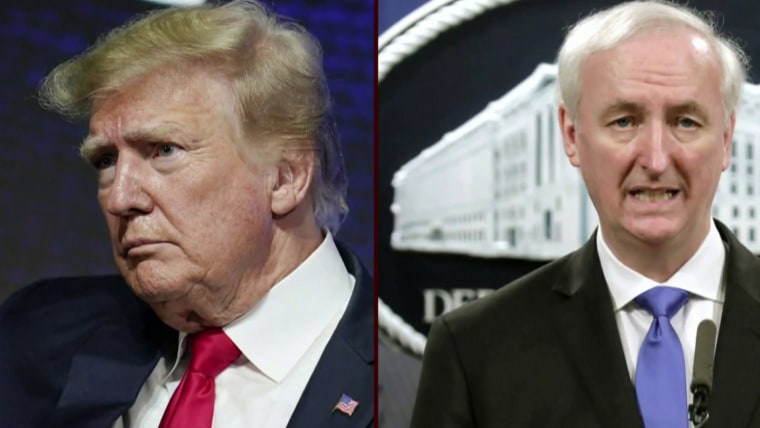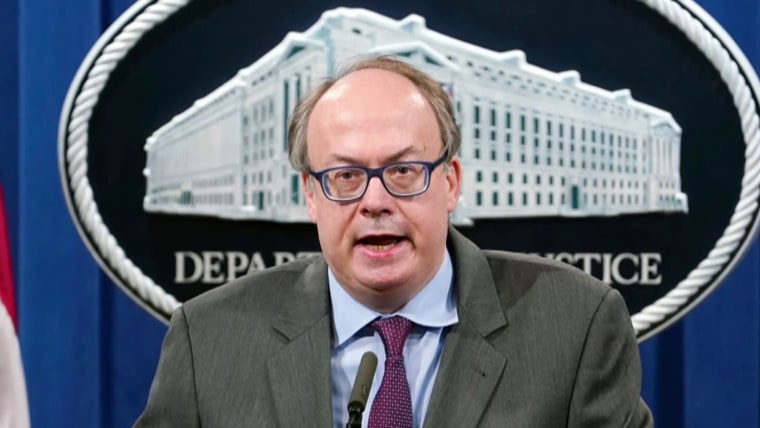Imagine for a moment the uproar that would have occurred on Jan. 3, 2021, if 100 or so top Justice Department lawyers had resigned en masse.
Our country narrowly dodged that turmoil following an Oval Office meeting that Sunday afternoon, three days before Congress would convene to certify Joe Biden as the winner of the 2020 presidential election. Acting Attorney General Jeffrey Rosen requested the meeting after he learned earlier that day that President Donald Trump planned to fire him and replace him with an underling. Rosen’s offense? Refusing to go along with Trump’s false claims that the Justice Department had found fraud in the election.
Rosen’s offense? Refusing to go along with Trump’s false claims that the Justice Department had found fraud in the election.
On Thursday, the Jan. 6 committee will conduct Day 5 of its hearings on the attack on the U.S. Capitol and related events. The announced witnesses are Rosen and two other former Justice Department officials who attended the Oval Office meeting, Richard Donoghue and Steve Engel. We can certainly expect the committee to ask these officials about the Oval Office meeting and, more generally, the role of the Justice Department in stopping the “big lie.” But based on testimony provided to the Senate Judiciary Committee last July, we already know quite a bit about the Oval Office incident.
The House Jan. 6 committee is holding its fifth public hearing on Thursday, June 23 at 3 p.m. ET. Get expert analysis in real-time on our liveblog at msnbc.com/jan6hearings.
As described in a Senate report, Rosen told the committee that at about 3 p.m. on Jan. 3, another Justice Department official, Jeffrey Clark, had told him that Trump would be replacing Rosen with Clark as acting attorney general. This was a bizarre situation. As anyone familiar with the Justice Department knows, a president typically does not replace an acting attorney general in the waning days of an administration. And it would be even more bizarre for the attorney general to be notified of his dismissal by a subordinate.
But everything about those early days of 2021 was bizarre. According to the testimony provided to the Senate Judiciary Committee, Clark had taken an active role in pushing Trump’s claims of election fraud after Rosen refused.

Before he resigned in December 2020, Attorney General William Barr had publicly stated that there was no evidence of widespread voter fraud that would change the outcome of the election. As we heard during the House’s Jan. 6 committee’s first hearing this month, Barr told Trump that claims of election fraud were “bullshit.”
Following Barr’s departure, Rosen took over as acting attorney general and promptly became the target of “persistent” demands by Trump to discredit the election results. Donoghue, who served as Rosen’s deputy, has also testified before the Senate Judiciary Committee about this tense period. According to Donoghue’s handwritten notes, Rosen refused to open an investigation because there was no evidence of fraud, telling Trump that the Justice Department “can’t + won’t snap its fingers + change the outcome of the election.” Rather than back down, Donoghue’s notes state, Trump told Rosen to “just say the election was corrupt + leave the rest to me and the R Congressmen.” We can expect to hear more about these exchanges during Thursday’s hearing.
But while Rosen and Donoghue refused to support Trump’s efforts, Clark was apparently only too willing. After having met directly with Trump — in violation of the Justice Department’s White House contacts policy — Clark drafted a letter to the members of the Georgia Legislature noting nonexistent “irregularities” and suggesting that they convene to select their own slate of electors for the state. This letter was drafted as a “proof of concept” that could be used in other swing states Biden won. Rosen flatly refused to sign it.
While Rosen and Donoghue refused to support Trump’s efforts, Clark was apparently only too willing.
All of this was the context for Rosen’s requested showdown with Trump. Expecting the worst, Rosen and Donoghue scrambled to alert their colleagues. They convened a conference call with seven top Justice Department leaders, all of whom agreed to resign together if Trump fired Rosen. As detailed by the Senate report, an email message was prepared that would be sent in the event of Rosen’s firing to the heads of all Justice Department components, the staffs of the attorney general and the deputy attorney general, and the U.S. attorneys who were serving as co-chairs of the Attorney General’s Advisory Committee, or AGAC. As a former U.S. attorney who once served as vice chair of the AGAC, I am confident that the co-chairs would have shared the email with the country’s 91 other U.S. attorneys.
The draft email explained that Trump fired Rosen because he had “repeatedly refused the President’s direct instructions to utilize the Department of Justice's law enforcement powers for improper ends.” It also stated that Donoghue was resigning and appeared to suggest the recipients consider doing the same: “the decision of whether and when to resign and whether the ends of justice are best served by resigning is a highly individual question, informed by personal and family circumstances.”
It is unclear whether everyone in this group would have actually resigned, but no doubt many would have, possibly more than 100 lawyers. Mass resignations of that magnitude over an attack on the institution by the president would have sent an earthquake through the 115,000-employee Justice Department. It most certainly also would have thwarted Trump’s objective of clinging to power.
But, of course, the email would never be sent. Rosen and Donoghue were joined at the meeting in the Oval Office by Clark and Engel, the assistant attorney general for the Office of Legal Counsel, who will also testify Thursday. White House counsel Pat Cipollone and deputy Patrick Philbin were also there. After three hours, the other Justice Department officials, and even Cipollone and Philbin, threatened to resign if Trump replaced Rosen and if Clark’s letters were sent to state legislatures. Cipollone reportedly called Clark’s letter a “murder-suicide pact.”
While Trump backed down from firing Rosen, he did so only in the face of mass resignations, which would likely have triggered scores more. He must have realized that the consequences of resignations at this level and on this scale would be disastrous. Of course, Trump did not abandon his plan to challenge the election results. He simply chose a different path. As we know even more clearly after last week’s Jan 6 hearing, his next target would be Vice President Mike Pence, whom Trump pressured to refuse to certify the election results.
The testimony of Rosen, Donoghue and Engel on Thursday promises to show a president willing to abuse the Justice Department, in the words of Donoghue, “for improper ends.” This testimony is important because it shows — again — the lengths to which Trump would go to win the election. It also helps establish the corrupt intent needed to make a criminal referral to the same department Trump tried to decapitate.


